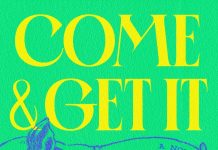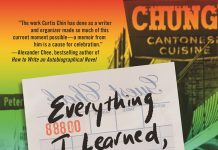The zigzaggy career of Ann Arbor-based author Jim Ottaviani ‚ÄĒ who‚Äôs now published more than a dozen science-centric graphic novels ‚ÄĒ began, in part, via a National Geographic article about nuclear engineering that featured illustrations by Barron Storey, an artist who, fittingly, inspired no small number of comic book creators.
‚ÄúI decided junior or senior year that [nuclear engineering] was what I‚Äôd do,‚ÄĚ says Ottaviani, who had at the time been a high school student living outside of Chicago.
After earning his bachelor’s degree at the University of Illinois Urbana-Champaign, Ottaviani came to Ann Arbor for a master’s degree in the same subject, then moved to Philadelphia to become a consultant for regional utility companies.
He took a few library science courses at nearby Drexel University to broaden his skills as a nuclear engineering consultant, then decided to take a hard left turn. He came back to the University of Michigan to pursue a master’s in library science
‚ÄúIt was a dive down the income ladder that most people are not willing to contemplate,‚ÄĚ Ottaviani jokes. ‚ÄúAnd now I write comics, as I continue in free fall.‚ÄĚ
Yes, while working as an engineering librarian for U-M (he’s now retired), Ottaviani first ventured into authordom in the 1990s. Though Ottaviani had long been a comics fan, he’d only written reviews of them online before a casual conversation with comic book artist Steve Lieber led Ottaviani to develop his first graphic novel, , a collection of stories about influential scientists.
Several more graphic novels followed, including his most recent,, as well as , , , , , and others.
The latter titles hint at Ottaviani’s longtime fascination with space exploration, so it’s easy to imagine his excitement at being named a NASA solar system ambassador in March.
In this capacity, Ottaviani has thus far helped judge a scholarship competition and a photo contest, but he also hopes to deliver presentations in local schools (and beyond).

‚ÄúIf you are younger than 21‚ÄĒwhich will be a lot of the people I‚Äôll be talking to ‚ÄĒ there have been people living in space all your life,‚ÄĚ Ottaviani says. ‚ÄúThat‚Äôs kind of wild. And for folks our age, ‚Ķ we knew about nine planets. We now know about thousands. ‚Ķ So things have been happening.‚ÄĚ
Ottaviani applied to be part of NASA’s volunteer program after visiting Headlands International Dark Sky Park in Mackinaw City last summer.
‚ÄúPrior to the observing time, there was a presentation,‚ÄĚ Ottaviani says. ‚ÄúThis person was a solar system ambassador, and I thought, ‚ÄėWow, that‚Äôs a cool thing to do.‚Äô‚ÄĚ
As for Ottaviani’s next graphic novel, the writer drew inspiration from another longtime personal interest: running.
More specifically, Ottaviani found himself transfixed by , in which Kenyan runner Eliud Kipchoge attempted, in controlled circumstances, to run a marathon’s distance in less than two hours. Kipchoge’s first try happened in Italy in 2017. At the same moment, at home here in Michigan, Ottaviani asked
his wife if she’d stay up another half-hour to watch Kipchoge’s start.
‚ÄúWe ended up staying up until 2:30, 3 in the morning ‚ÄĒ whenever it was over ‚ÄĒ just because it was so fascinating to watch,‚ÄĚ Ottaviani says. ‚ÄúThis man is beautiful when he runs. But he failed. ‚Ķ Two years later, he did it with slightly improved shoes, a new wedge of people breaking the wind in front of him, a better pace car
in front ‚ÄĒ all these crazy things, all these little adjustments that it takes to do something like this. And that‚Äôs what got me thinking: What are the limits?‚ÄĚ
Limits, the working title of Ottaviani’s next book, thus explores the limits of human physical and mental performance, and it’s targeted at middle school- aged readers.
Expanding beyond Kipchoge‚Äôs ambition, Ottaviani also chronicles in the book the push to break the four-minute mile; the reasons why no sprinter will likely get all that close to a nine-second 100-meter dash (‚ÄúThe force you have to apply to the ground, and the amount of time that you have to lift back up, needs an impact that‚Äôs so hard that it would start tearing apart your joints and your tendons,‚ÄĚ Ottaviani explains); and perspectives on how high we can jump, how much we can lift, and how participating in a team can alter performance.
‚ÄúI just got interested and started learning more about it,‚ÄĚ Ottaviani says.
But then, that seems to be the start of all Ottaviani’s graphic novel projects.
This story is from the August 2023Őżissue of ¬ť∂Ļ∑¨ļŇ Detroit magazine. Read more in our digital edition.
|
| Őż |
|








